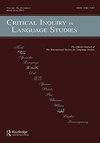Toward a Bourdieusian theory of multilingualism
引用次数: 7
Abstract
ABSTRACT Attempts at the definition of multilingualism range from the structuralist interpretation as the coexistence of multiple codes to the critical sociolinguistic efforts to go beyond the idea of languages as fixed entities. The author’s purpose is to explore the suitability of Pierre Bourdieu’s model of linguistic production and circulation to account for the phenomenon of multilingualism. Central to this endeavor are the linguistic biographies of five second-generation British-Arab multilingual immigrants based in Cardiff, Wales. Starting from the idea that in Cardiff primarily linguistic practices with English are dominant, the question that arises refers to the immanent sociohistorical conditions and power relations that allow these agents to produce linguistic practices with Arabic, apart from English. The analysis of the interviews through the Bourdieusian conceptual lenses allows a focus on the linguistic habitus of the multilingual interviewees, which is defined as an integral set of linguistic dispositions adapted not only to the multiple linguistic markets they are part of, but also to the unbalanced power relations among such markets. These results demonstrate that an adapted version of the Bourdieusian model allows for a complex redefinition of multilingualism from the perspective of the immanent power relations under which this phenomenon emerges.走向布迪厄的多语理论
对于多语现象的定义,既有结构主义的解释,即多种语码的共存,也有批判社会语言学的解释,认为语言是固定的实体。作者的目的是探讨皮埃尔·布迪厄的语言生产和流通模型在解释多语现象方面的适用性。这一努力的核心是五个居住在威尔士加的夫的多语种的第二代英国阿拉伯移民的语言传记。从卡迪夫主要使用英语的语言实践占主导地位的想法开始,出现的问题是指内在的社会历史条件和权力关系,这些条件和权力关系允许这些代理人使用阿拉伯语进行语言实践,除了英语。通过布尔迪厄的概念透镜对访谈进行分析,可以关注多语种受访者的语言习惯,这被定义为一套完整的语言倾向,不仅适应他们所处的多种语言市场,而且适应这些市场之间不平衡的权力关系。这些结果表明,布尔迪厄模型的一个改编版本允许从这种现象产生的内在权力关系的角度对多语言进行复杂的重新定义。
本文章由计算机程序翻译,如有差异,请以英文原文为准。
求助全文
约1分钟内获得全文
求助全文
来源期刊

Critical Inquiry in Language Studies
Arts and Humanities-Language and Linguistics
CiteScore
5.30
自引率
0.00%
发文量
23
 求助内容:
求助内容: 应助结果提醒方式:
应助结果提醒方式:


